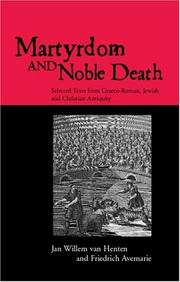| Listing 1 - 4 of 4 |
Sort by
|

ISBN: 1280335653 020399440X 9780203994405 0415138906 0415138914 9781280335655 9781134772230 9781134772278 9781134772285 9780415138901 9780415138918 1134772270 Year: 2002 Publisher: London New York Routledge
Abstract | Keywords | Export | Availability | Bookmark
 Loading...
Loading...Choose an application
- Reference Manager
- EndNote
- RefWorks (Direct export to RefWorks)
Martyrdom --- Death --- Suffering --- Martyrs --- Religious aspects
Book
ISBN: 9789462988187 9462988188 9789048540211 9048540216 Year: 2020 Publisher: Amsterdam : Amsterdam University Press,
Abstract | Keywords | Export | Availability | Bookmark
 Loading...
Loading...Choose an application
- Reference Manager
- EndNote
- RefWorks (Direct export to RefWorks)
The phenomenon of martyrdom is more than 2000 years old but, as contemporary events show, still very much alive. This book examines the canonisation, contestation and afterlives of martyrdom and connects these with cross-cultural acts and practices of remembrance. Martyrdom appeals to the imagination of many because it is a highly ambiguous spectacle with thrilling deadly consequences. Imagination is thus a vital catalyst for martyrdom, for martyrs become martyrs only because others remember and honour them as such. This memorialisation occurs through rituals and documents that incorporate and re-interpret traditions deriving from canonical texts. The canonisation of martyrdom generally occurs in one of two ways: First, through ritual commemoration by communities of inside readers, listeners, viewers and participants, who create and recycle texts, re-interpreting them until the martyrs ultimately receive a canonical status, or second, through commemoration as a means of contestation by competing communities who perceive these same people as traitors or terrorists. By adopting an interdisciplinary orientation and a cross-cultural approach, this book goes beyond both the insider admiration of martyrs and the partisan rejection of martyrdoms and concisely synthesises key interpretive questions and themes that broach the canonised, unstable and contested representations of martyrdom as well as their analytical connections, divergences and afterlives in the present.
Martyrdom --- Canonization --- 235.3*7 --- Rites and ceremonies --- Beatification --- Christian saints --- Death --- Suffering --- Martyrs --- 235.3*7 Martelaren --- Martelaren --- Religious aspects --- Canonization. --- Martyrdom. --- Martyrdom, canonization, commemoration. --- Martyre
Book
ISBN: 9004693297 9004693289 Year: 2024 Publisher: Leiden ; Boston : Brill,
Abstract | Keywords | Export | Availability | Bookmark
 Loading...
Loading...Choose an application
- Reference Manager
- EndNote
- RefWorks (Direct export to RefWorks)
Two millennia ago, the Jewish priest-turned-general Flavius Josephus, captured by the emperor Vespasian in the middle of the Roman-Jewish War (66–70 CE), spent the last several decades of his life in Rome writing several historiographical works in Greek. Josephus was eagerly read and used by Christian thinkers, but eventually his writings became the basis for the early-10th century Hebrew text called Sefer Yosippon, reintegrating Josephus into the Jewish tradition. This volume marks the first edited collection to be dedicated to the study of Josephus, Yosippon, and their reception histories. Consisting of critical inquiries into one or both of these texts and their afterlives, the essays in this volume pave the way for future research on the Josephan tradition in Greek, Latin, Hebrew, and beyond.
Ancient Judaism. --- Biblical Studies. --- Classical Studies. --- Judaism --- History --- Josephus, Flavius. --- Rome
Book

ISBN: 3110798093 3110796244 Year: 2022 Publisher: Berlin ; Boston : De Gruyter,
Abstract | Keywords | Export | Availability | Bookmark
 Loading...
Loading...Choose an application
- Reference Manager
- EndNote
- RefWorks (Direct export to RefWorks)
The nucleus of society is situated at the local level: in the village, the neighborhood, the city district. This is where a community first develops collective rules that are intended to ensure its continued existence. The contributors look at such configurations in geographical areas and time periods that lie outside of the modern Western world with its particular development of society and statehood: in Antiquity and in the Global South of the present. Here states tend to be weak, with obvious challenges and opportunities for local communities. How does governance in this context work? Scholars from various disciplines (Classics, Theology, Political Science, Sociology, Social Anthropology, Human Geography, Sinology) analyze different kinds of local arrangements in case studies, and they do so with a comparative approach. The sixteen papers examine the scope and spatial contingency of forms of self-governance; its legitimization and the collective identity of the groups behind them; the relations to different levels of state governance as well as to other local groups. Overall, this volume makes an interdisciplinary contribution to a better understanding of fundamental elements of local governance and statehood.
LITERARY CRITICISM / Ancient & Classical. --- civil society. --- collective identity. --- global history. --- limited statehood.
| Listing 1 - 4 of 4 |
Sort by
|

 Search
Search Feedback
Feedback About UniCat
About UniCat  Help
Help News
News